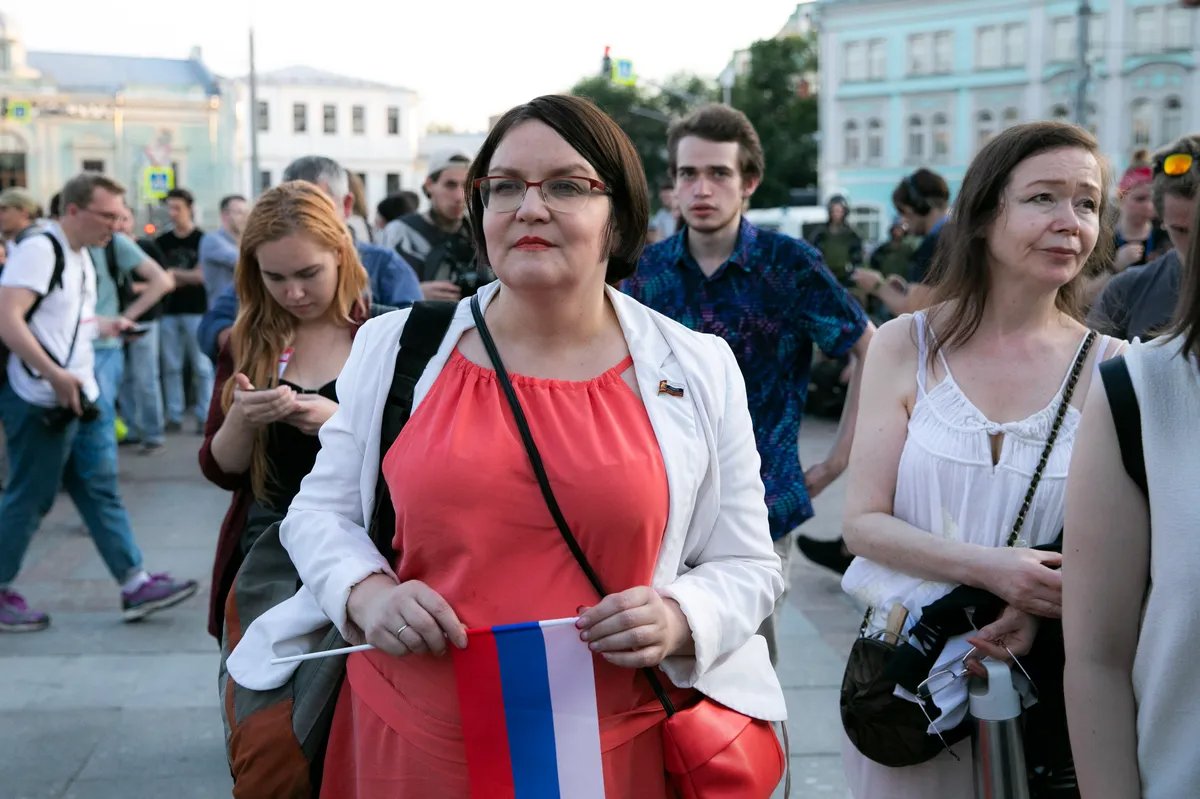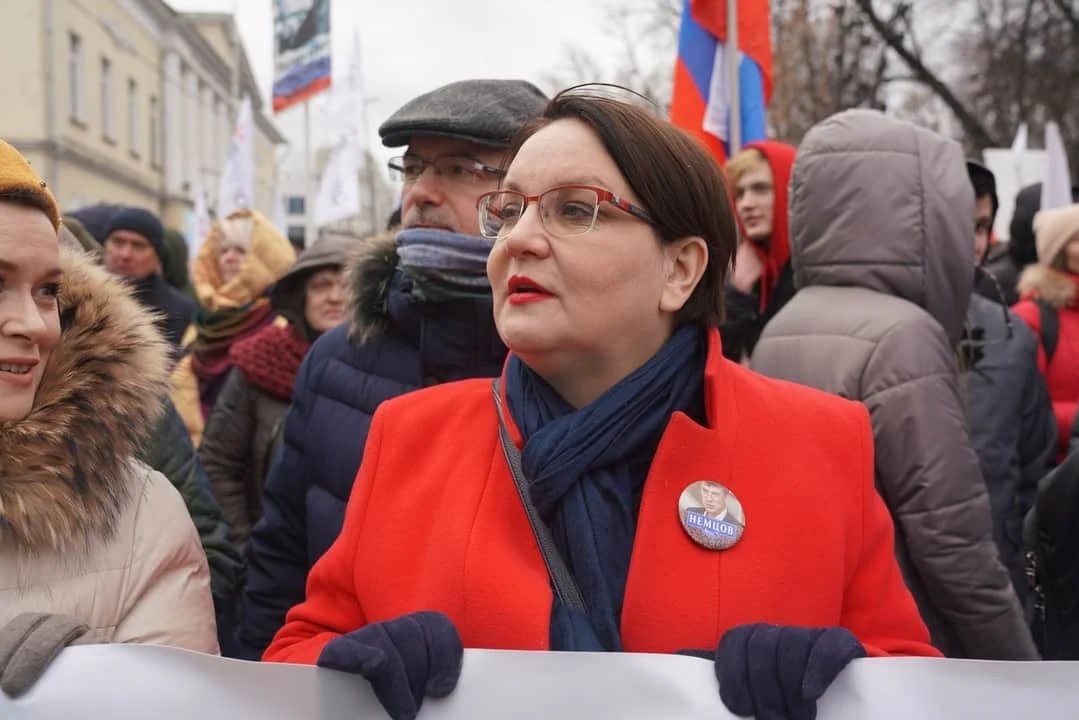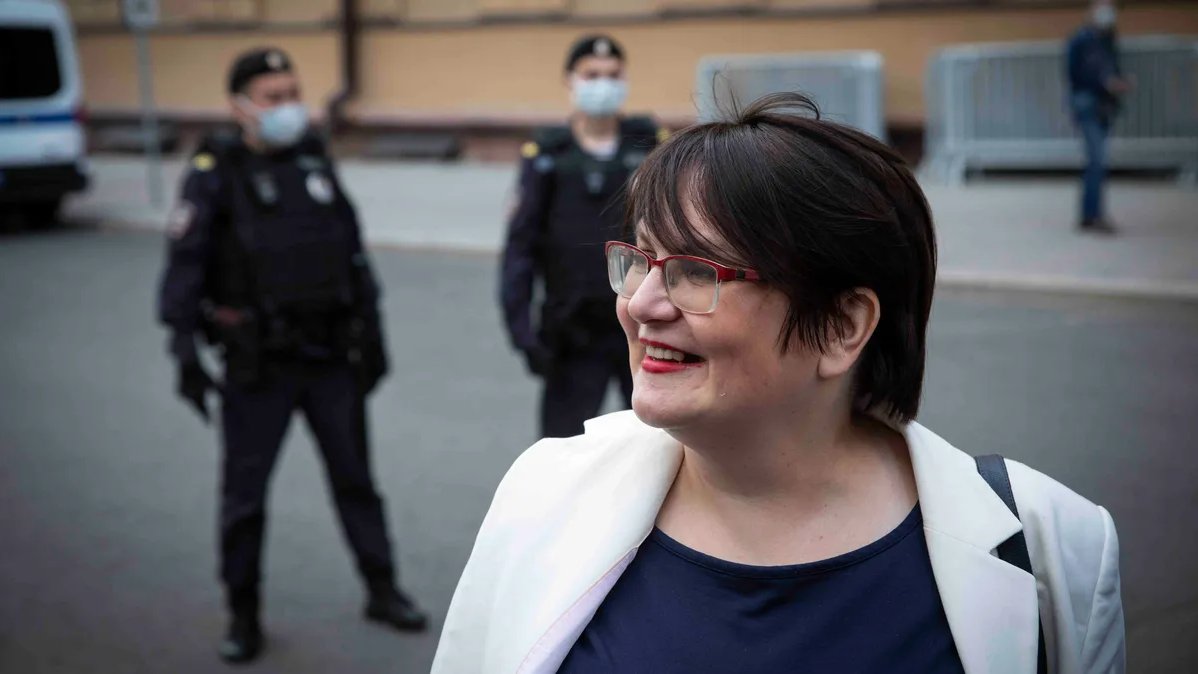Yulia Galyamina is a politician with no post, an increasingly common phenomenon in Russia, where most anti-Kremlin voices have been silenced, forced into exile, or worse. Galyamina is nevertheless also one of the few opposition politicians who has decided to remain in Russia since the invasion of Ukraine began and the risk of persecution rose enormously.
There are a few reasons for that, she says, speaking with me from her dacha outside Moscow. Most importantly, she believes that a politician should remain close to her supporters in order to “understand their lives, to feel what people in Russia want”.
A philologist by training, Galyamina’s political career began nearly a decade ago, although she didn’t win office until 2017, when she was elected as a candidate for the Yabloko party to be a municipal deputy in Moscow’s Timiryazevsky district, giving her a say in local urban planning, housing and infrastructure improvements.
Changing status
Galyamina, 50, has for years been engaged in grassroots organisation and attending rallies and campaigning for fairer elections, even spending several nights behind bars for daring to take to the streets. One acquaintance told Novaya-Europe that since 2018 Galyamina had been seen at “almost every protest rally there was”.
In the spring of 2020, Galyamina joined other opposition figures in creating the “No” campaign to protest amendments to the Russian constitution, which, among other things, allowed Russian President Vladimir Putin to run for office two more times.
When the amendments came into force in July 2020, a wave of protest swept across Russian cities, and Galyamina was among some 130 peaceful protesters who were detained by the police at a rally in Moscow. As Galyamina had been arrested for protesting in the past, a criminal case was brought against her and the prosecutor’s office requested she be given three years in prison.
When the article Galyamina was charged under was added to Russia’s criminal code in 2014, it was immediately clear that it was aimed at the regime’s opponents. “It’s the first ‘political’ article in our criminal code,” according to lawyer Maria Eysmont. “Of course, there have been political trials before, but officially political opponents were tried under general criminal articles.”

Photo: Novaya Gazeta Europe
The court found Galyamina guilty and sentenced her to a two-year suspended sentence, a far more lenient punishment than many protesters have been given. She was also stripped of her municipal deputy status and given a new one as a “foreign agent”, a designation the Russian state can give to any individual or organisation believed to “receive support” from abroad, which imposes restrictions on public activity and disbars people from a number of jobs.
In the face of so much legal pressure, Galyamina demonstrated remarkable fortitude, even delivering a speech while challenging her foreign agent status in court about her concept of patriotism, in which she argued that
“a real patriot is one who opposes the special military operation, but it is us who they are trying to call foreign agents”.
Since then she has often pledged not to take the route of exile: “For me, leaving the country would be the worst thing that could happen”, she explains, extending her thinking to other politicians as well. Speaking of opposition politician Alexey Navalny’s decision to return to Russia despite knowing full well he would be arrested and imprisoned, Galyamina is adamant that “politically he did the right thing.” In her opinion, calling yourself a Russian politician means remaining in Russia.
Expelling the teacher
Alongside politics Galyamina has also spent years in academia, teaching at some of Russia’s top universities including Moscow State University and the Higher School of Economics (HSE). “Teaching is probably the most enjoyable job on earth other than being a politician,” she says. “When you give knowledge to others, you learn yourself, you start to understand things you didn’t understand or couldn’t understand.”
One of Galyamina’s former students at HSE told Novaya-Europe that her students loved having her as their teacher, recalling her readiness to meet students halfway when they were having trouble meeting their deadlines.
However, Galyamina’s teaching career ended abruptly last year when she was dismissed from the Russian Presidential Academy of National Economy and Public Administration as “foreign agents” are barred from teaching. Galyamina was offered a choice of non-teaching positions at the university such as a cleaner, cloakroom attendant, or librarian, she says. She intends to challenge her foreign agent status at Russia’s Constitutional Court on the basis that the law behind it infringes on the constitutional right “to have a different opinion”.
The Kremlin has been tightening its grip on higher education in Russia for years, especially in the field of social sciences. Galymina fears that it’s going to become increasingly challenging for Russian students to get a good-quality university education. “Political science, philosophy, sociology, journalism — everything is very difficult now,” she says.
Galyamina has been a part of numerous sociopolitical projects and her most recent one — named Soft Power — launched on 24 February last year, the same day that Russia invaded Ukraine.

Photo: Facebook
Soft Power is a women-led organisation that boasts some 170 members and is aimed at helping women in need and training women to be the political leaders of tomorrow. Since its launch, the group has spearheaded writing petitions, organising strikes and creating educational content. One petition against the mobilisation of Russia’s military last September got over 500,000 signatures, which clearly struck a nerve — Galyamina believes it was this particular project that saw Soft Power slapped with its own foreign agent label.
The organisation, even though it labels itself as aimed at women, studiously avoids the use of the word feminist in its campaign literature, in a country where the term is often viewed negatively. “Women’s rights in Russia are limited in precisely the same way that human rights are limited across the board. That’s the root cause.” Galyamina says, adding:
“Russia needs everything. Anything to help its fight for human rights.”
Galyamina points to domestic violence as the single biggest problem women face in Russian society today. In 2017, a new law decriminalised “moderate” domestic violence (resulting in bruises but not broken bones), making its maximum punishment just 15 days in jail. Despite one estimate that 71% of the women murdered in Russia in 2020-2021 died as a result of abuse in the home, senior officials continue to play down its “exaggerated” role.
“The issue of domestic violence is completely unresolved in legal terms,” Galyamina says. “Violence itself is not recognised as a norm and that’s a great achievement and a value change in society in recent years. But there are no legal instruments to combat the violence. Even for those police officers, for example, who would like to help.”
Russia’s changing values
Russian NGOs that support domestic violence survivors have also become a target for the government, and the majority have already been given foreign agent status. This attack on civil society is the government’s response to swiftly changing Russian values, Galyamina believes.
“I first noticed it in 2014,” she recalls. “Aversion to violence, interest in self-development, aesthetic needs, desire for a decent life. It’s these value changes that ultimately lead to changes in power.”
Even the annexation of Crimea in 2014 was the Russian government’s attempt to distract from the ongoing changes in society, Galyamina argues, though she notes the effect didn’t last for very long. “As early as 2017-2018, it all started back up again, priorities began to change and distrust of Putin and the system as a whole began to re-emerge,” she says, adding that the Kremlin’s attempt last year to “gift its supporters Kyiv” also proved unsuccessful.
“Many people just want to tread water and keep a low profile,” Galyamina says, adding that societal change in Russia has already happened, but that the structural and institutional change now needed remains out of reach in the current political climate. “We are in a state of confusion. But the future is ours.”
Join us in rebuilding Novaya Gazeta Europe
The Russian government has banned independent media. We were forced to leave our country in order to keep doing our job, telling our readers about what is going on Russia, Ukraine and Europe.
We will continue fighting against warfare and dictatorship. We believe that freedom of speech is the most efficient antidote against tyranny. Support us financially to help us fight for peace and freedom.
By clicking the Support button, you agree to the processing of your personal data.
To cancel a regular donation, please write to [email protected]

